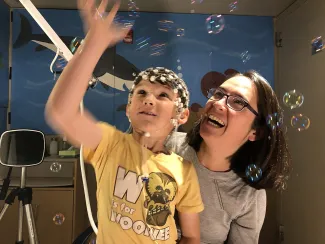Wilkinson Lab Research | Overview
Our lab is interested in understanding the neural mechanisms impairing language acquisition and cognitive development across a range of neurodevelopmental disorders, especially those associated with intellectual disability. Ongoing studies in the lab use electroencephalography (EEG) to identify biomarkers of language development in young children with Fragile X syndrome, Down syndrome, and autism spectrum disorders. Biomarkers identified through these studies could be used as objective measures of language prognosis, treatment monitoring during clinical trials, and development of effective therapeutics.
We are also interested in understanding biological and environmental factors that impact early brain development and, in turn, functional outcomes in children. In collaboration with Charles Nelson’s lab within the Labs of Cognitive Neuroscience, our studies leverage EEG and behavioral/developmental data collected in infants and children longitudinally across the first three years of life. Here, we aim to better characterize the expected developmental trajectory of a variety of EEG-based brain measures over those first three years, and determine what individual differences in developmental trajectory are associated with developmental outcomes.
Together, the ultimate goal of our research is to guide the development of effective therapies to improve developmental outcomes and functional independence for children with neurodevelopmental disorders.

